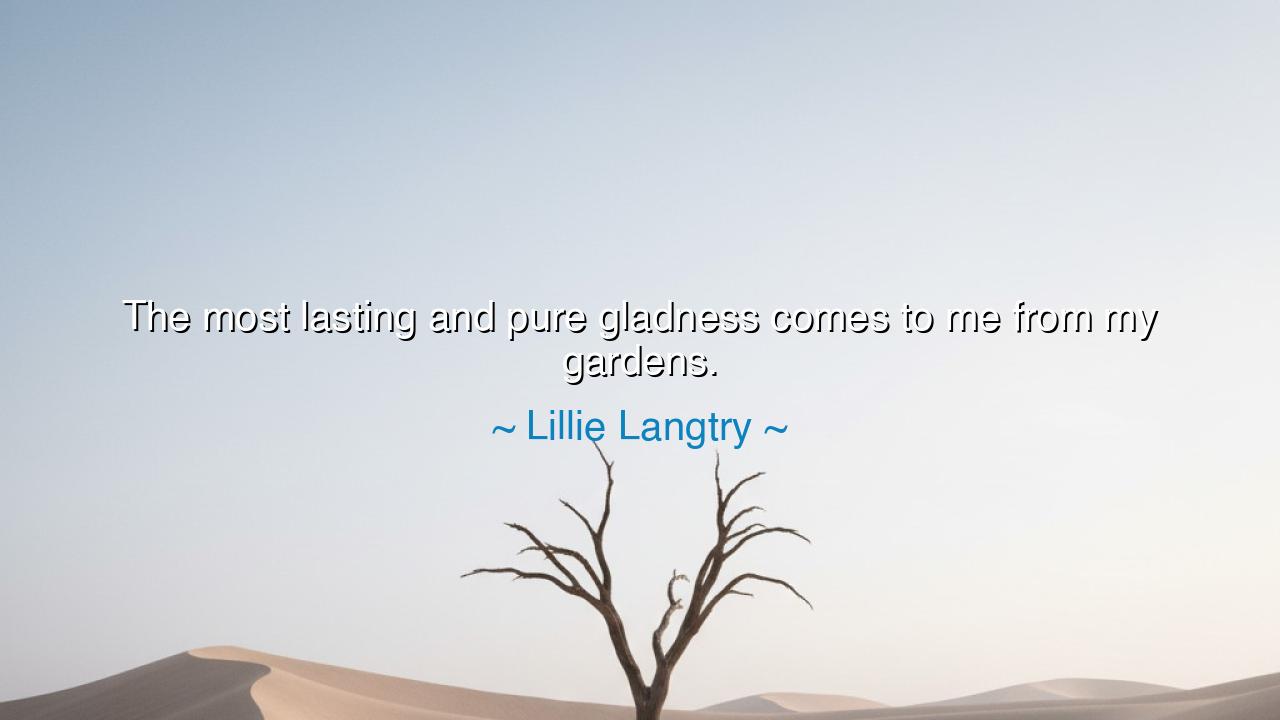
The most lasting and pure gladness comes to me from my gardens.






O Seekers of True Joy, gather round and hear the words of Lillie Langtry, for within them lies a profound truth that has resonated through the ages. "The most lasting and pure gladness comes to me from my gardens." In this simple statement, Langtry speaks of the deep and lasting joy that comes from the quiet, patient cultivation of life—a joy that is not fleeting, but rooted in the earth, in the act of nurturing, and in the connection to something far greater than the self. Just as the ancient gardeners tended to the land, bringing forth abundance from the soil, so too did Langtry find her peace and happiness in the sacred act of tending to her garden.
In the ancient world, the connection between humans and the earth was seen as sacred. The Greeks and Romans knew that the land was a reflection of the soul, and to tend to the earth was to honor the divine. The great philosopher Aristotle believed that human flourishing came not from material wealth or transient pleasures, but from the cultivation of the inner life, which could be found in both the mind and the earth. He, like Langtry, understood that the simplest act of tending to the land could bring about the purest form of gladness. The garden, in its simplicity, is a place where the soul can find peace, a place where one can reconnect with the eternal cycles of growth, decay, and renewal.
Consider, O Seeker, the example of the great Cato the Elder, whose wisdom was rooted in his knowledge of the land. Cato was not only a statesman and a soldier but a farmer whose teachings on agriculture were considered foundational by the Romans. He believed that to be truly happy, one must tend the land, as it was through hard work and communion with nature that a person could find lasting satisfaction. In his own life, Cato found joy in his farm, seeing it not just as a source of food, but as a source of peace and purpose. Like Langtry, he understood that true joy does not come from fleeting pleasures or external rewards, but from the quiet, ongoing work of nurturing life and finding meaning in the simplest of tasks.
Langtry’s love for her gardens reminds us that joy—the purest and most enduring kind—comes from the ability to be present, to engage with the world in a way that is nurturing and sustainable. It is not the grand gestures or fleeting triumphs that bring lasting happiness, but the patient, mindful acts that allow life to grow and evolve in its own time. Gardening teaches us this timeless lesson. Just as the gardener waits for seeds to sprout, so must we wait for the fruits of our own labors—be they in work, relationships, or personal growth. There is a deep satisfaction in knowing that, though the harvest may not come immediately, it will come if we are diligent, patient, and tender in our care.
Gardening also reminds us of the cycles of life itself—of birth, growth, decay, and renewal. The ancients understood that everything in life is subject to the rhythms of nature, and that true wisdom comes from understanding these cycles and working within them. Langtry’s connection to her gardens reflects this ancient wisdom. In the garden, there is a deep recognition of impermanence—of the delicate balance between life and death, between growth and decay. But it is this very balance, this eternal rhythm of nature, that brings a sense of peace and contentment. The garden is not only a place of growth but also a place of reflection, a space where we can contemplate the transitory nature of life and find comfort in the knowledge that, just as the seasons change, so too will our own lives unfold.
So, O Seeker, let us take Langtry’s words to heart: the purest and most lasting joy is found not in the fleeting distractions of the world, but in the simple, mindful acts that connect us to the earth and to the deeper rhythms of existence. Whether it is through gardening, creating something with our hands, or taking time to reflect on our lives, we must learn to find peace in the process, in the work, not in the outcome. Just as the gardener finds joy in the act of planting, tending, and nurturing, so too must we find satisfaction in the process of living, trusting that the fruits of our labor will come in time.
In conclusion, O Seeker, remember this: true joy is not a fleeting emotion to be chased, but a state of being that arises when we are connected to the rhythms of life itself. Like the gardener, we must nurture the soil of our own souls, tending to it with care and patience, knowing that in doing so, we will reap the rewards of lasting gladness. Let Lillie Langtry’s words be a reminder that in simplicity, in nature, and in the quiet work of life, we find the most enduring and profound forms of happiness. Tend to your gardens, both literal and metaphorical, and you will discover the peace that comes from nurturing life and embracing the flow of time.






AAdministratorAdministrator
Welcome, honored guests. Please leave a comment, we will respond soon